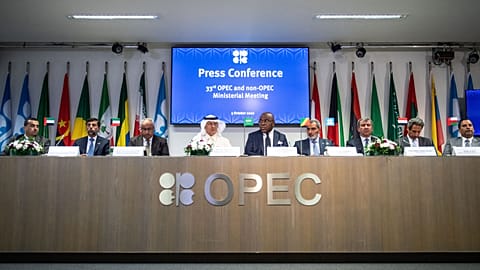We’re grappling with a climate ‘information crisis’ on X, Facebook and Instagram, disinformation experts say.
Misinformation is exacerbating the climate crisis, experts warn as world leaders prepare to meet for COP28 in Dubai.
 ADVERTISEMENT
ADVERTISEMENT
 ADVERTISEMENT
ADVERTISEMENT
In 2023, you’d be forgiven for thinking that any widespread doubts about the scientific facts of climate change - and the urgent need to act on them - have been laid to rest.
But this year has seen a “re-mainstreaming” of outright denial, as well as insidious new tactics by big oil and bad faith actors online, a new report by the Climate Action Against Disinformation (CAAD) coalition reveals.
“On the eve of COP28, the world is grappling with an environmental crisis compounded by an information crisis,” says Jennie King, Head of Climate Research and Policy at the Institute for Strategic Dialogue and CAAD Intelligence Lead.
“2023 is set to be the hottest year on record, yet the urgent climate action we need is beset by denialism and viral campaigns that reject the scientific consensus. Such content not only undermines public support, but increasingly erodes trust in institutions and is producing violent outcomes.”
What is climate misinformation and disinformation?
If you’ve been on Twitter as it morphed into X this year, or been bombarded with dubious Facebook and Instagram ads, you probably have some sense of what CAAD are up against.
Misinformation is defined as false or out-of-context information that is presented as fact. While disinformation is a type of misinformation that is intentionally false and intended to deceive.
But who is behind this information crisis exactly? As CAAD’s investigations show, some unusual connections are being forged.
“The professionalised efforts of the fossil fuel lobby are now intersecting with State-sponsored PR, online grifters and commercial disinformers,” adds King.
Here are four key trends to be aware of.
4. #ClimateScam is now consistently trending on X
Use of the hashtag #ClimateScam suddenly spiked on Twitter in July 2022. By November it was consistently appearing as a top result - a particularly concerning state of affairs during COP27. X’s autocomplete feature in the search bar still points users towards it, even with incomplete searches starting #cl.
The virality of ‘climate scam’ was initially baffling to the experts, as the term appeared to be trending despite data showing more activity and engagement on other hashtags such as #ClimateCrisis and #ClimateEmergency.
But in contrast to 2022, CAAD notes that this pattern is now associated with clear trends in performance and the viral nature of related posts across the platform.
The popularity of #climatescam appears to be driven by a small group of accounts that have seen their audience grow since Elon Musk took X private, says CAAD. For example, one account grew from just 322 followers from their first #climatescam post in March to over 256,000 followers now.
The hashtag is being used to deny climate change’s contributions to extreme weather events worldwide on X, which is still a major public forum for live commentary on news stories.
3. Websites that publish climate misinformation are profiting through ads
15 websites that publish popular climate misinformation, including - according to CAAD - The Daily Telegraph, Breitbart and Sky News Australia, are profiting from this content.
UK-based newspaper The Daily Telegraph, for example, published 171 opinion pieces on environmental issues during the past year. Of these, 85 per cent attacked and/or undermined climate science, policy or associated groups, according to journalistic and activist website DeSmog.
Ad exchanges (or “ad tech” companies) are marketplaces in which online advertising is bought and sold. Many of the companies servicing these new sites - such as Google and Amazon - have policies that are meant to stop publishers from accessing their products if the content they host contradicts the science on climate change.
But CAAD found that more than 150 ad exchanges are allowing the monetisation of climate mis- and disinformation.
This means that many brands aligned with decarbonisation appear next to these articles, most likely without their knowledge and against their stated corporate values.
2. Big Oil is spending millions on Meta ads
Up to $5.21 million (€4.75 million) in advertising money was spent by just 13 fossil fuel companies between January and October 2023, according to Meta’s Ad Library. This secured the firms 2,562 ads on Facebook.
But since CAAD could only view ads labelled as affecting ‘Social Issues, Elections or Politics’, the coalition says company spending may vastly exceed this number.
Fossil fuel corporations - Shell, ExxonMobil, BP and TotalEnergies - accounted for 98 per cent of the identified ad spend.
Oil and gas giants tend to talk up their renewables investment to the public, but CAAD’s analysis is another shocking look into the gulf.
Ad content regularly emphasises sustainability or other ‘socially progressive’ credentials for the carbon majors in question. But fossil fuel companies were behind only 1 per cent of global investment into clean energy in 2022, according to a new report by the International Energy Agency.
1. Russian state media accounts are weaponising climate debates
Within social media storms around climate mis- and disinformation, Russian state-backed accounts appear as agents of chaos.
These accounts don’t have consistent messaging on climate science, action or energy supply, according to CAAD. Instead, they are using these topics to strengthen their influence campaigns targeting Western countries and the Global South respectively.
The way Russian State media outlets and Russian Embassy accounts post about energy very much depends on who is involved. Fossil fuel investments in Africa were condemned as attempts to ‘steal’ the continent’s resources when linked to Western countries, says CAAD, but hailed as championing economic development when related to Russia.
Russian accounts have also sought to discredit oil sanctions imposed by Western governments following the country’s invasion of Ukraine. CAAD found that they routinely vilify climate protesters in European countries, with posts in German, English, French and Spanish highlighting the disruptive nature of activism.
Analysts have also seen a rise in explicitly negative descriptions and personal attacks on climate figureheads, especially Greta Thunberg. An English-language post by Russian state-controlled media RT on Facebook, for example, refers to Greta as “Dr Climate Gollum”.
With COP28 starting tomorrow, King concludes that “We must recognise the threat of mis- and disinformation for what it is: a barrier to cohesion, to action, and to a liveable future for all.”

















